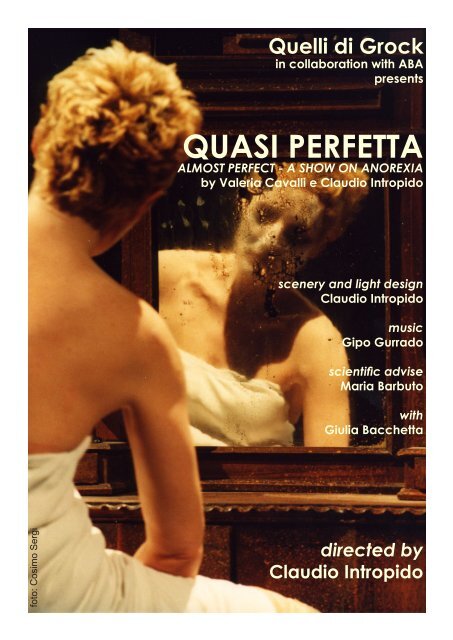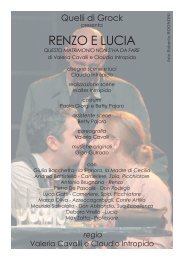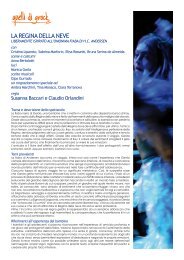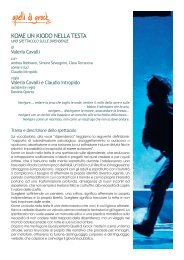Quelli di Grock with collaboration of ABA presents Quelli di Grock ...
Quelli di Grock with collaboration of ABA presents Quelli di Grock ...
Quelli di Grock with collaboration of ABA presents Quelli di Grock ...
You also want an ePaper? Increase the reach of your titles
YUMPU automatically turns print PDFs into web optimized ePapers that Google loves.
foto: Cosimo Sergi<br />
<strong>Quelli</strong> <strong>di</strong> <strong>Grock</strong><br />
in <strong>collaboration</strong> <strong>with</strong> <strong>ABA</strong><br />
<strong>presents</strong><br />
QUASI PERFETTA<br />
ALMOST PERFECT - A SHOW ON ANOREXIA<br />
by Valeria Cavalli e Clau<strong>di</strong>o Intropido<br />
<strong>Quelli</strong> <strong>di</strong> <strong>Grock</strong><br />
<strong>with</strong> scenery <strong>collaboration</strong> and light design <strong>of</strong> <strong>ABA</strong><br />
Clau<strong>di</strong>o Intropido <strong>presents</strong><br />
music<br />
Gipo Gurrado<br />
scientific advise<br />
Maria Barbuto<br />
<strong>with</strong><br />
Giulia Bacchetta<br />
<strong>di</strong>rected by<br />
Clau<strong>di</strong>o Intropido
Technical note<br />
Stage 8x8 m<br />
Stage rigging not necessary<br />
Total darkening needed<br />
Electric power 10 kW<br />
Assemblage 4 h<br />
Showtime 75 min<br />
Genre actor’s theatre<br />
QUELLI DI GROCK<br />
Via Emanuele Muzio 3<br />
20124 Milano - Italy<br />
Tel. +39 02.66988993<br />
Fax +39 02.6690173<br />
www.quelli<strong>di</strong>grock.it<br />
international@quelli<strong>di</strong>grock.it<br />
SYNOPSIS<br />
On stage a single actress tells us the story <strong>of</strong> Alice, a once anorexic girl who<br />
is now cured: Alice narrates her story <strong>with</strong> great exigency and the need to<br />
make known her problem as it is too <strong>of</strong>ten veiled and unknown.<br />
Her story is a story like many others in which an unease, apparently<br />
unremarkable, changes, increases and consequently alters and becomes a<br />
serious illness.<br />
In the play, Alice is surrounded by some key personalities, all parts interpreted<br />
by the same actress: a competitive and uninviting mother, a practically absent<br />
father, a friend who does not understand, a love never returned and Adele,<br />
the caretaker in her buil<strong>di</strong>ng, a warm-hearted and understan<strong>di</strong>ng person.<br />
Alice brings on stage a sort <strong>of</strong> <strong>di</strong>ary made <strong>of</strong> flash-backs, memories, images;<br />
the main character’s personality changes, her thoughts become obsessions.<br />
Step by step her uneasiness, blossomed as frequently happens silently and<br />
underhand, turns into something desperate and evident.<br />
The sincerity <strong>of</strong> the words which Alice pronounces at the end <strong>of</strong> the play<br />
in<strong>di</strong>cates the answer to a desperate need for help: anorexia has to be and<br />
can be cured and it is possible thanks to the support from those who love us<br />
and are near to us and show us <strong>with</strong> consciousness a way to start again and<br />
stand on our own feet.<br />
Almost perfect is a very strong and necessary play, but never tearful or<br />
pathetic, which faces the actuality and the harshness <strong>of</strong> the issue through an<br />
evocative and symbolic theatrical language.<br />
The unease narrated in this story examines eating <strong>di</strong>sorders but wants to represent<br />
a model for analysis and reflections on other mental and psychosomatic<br />
<strong>di</strong>sorders <strong>of</strong> our days, e.g. alcoholism, drug ad<strong>di</strong>ction, depression.<br />
ph & © Roberto ROGNONI
Festivals and awards<br />
“LiFest - Lo spettacolo<br />
delle scienze della vita”<br />
Gallarate (Italy) 2006<br />
“Segnali”<br />
Pavia (Italy) 2004<br />
E dopo più niente. Dopo<br />
non provi più niente.<br />
Dentro sei vuota, pulita,<br />
pura. Sei liscia, scavata,<br />
tutto entra ed esce da<br />
te con facilità. Entra<br />
ed esce. Scivola fuori,<br />
non si può fermare.<br />
Entra e quando stai<br />
per scoppiare ti svuoti.<br />
Via tutto quel peso,<br />
l’eccesso, quello che<br />
non serve, quello che, se<br />
resta lì, <strong>di</strong>venta la parte<br />
brutta <strong>di</strong> te. Invece<br />
così stai bene, vuota,<br />
leggera, che ti pare <strong>di</strong><br />
volare.<br />
NOTES ON THE PROJECT<br />
Quasi perfetta – Almost perfect had its opening in February 2004 and since then it<br />
toured many Italian cities before coming to Milan. This was a specific decision <strong>of</strong><br />
the company: thanks to the tour we finished our study about the au<strong>di</strong>ence and<br />
its reactions understan<strong>di</strong>ng the level <strong>of</strong> listening, necessity and attention to the<br />
subject <strong>of</strong> anorexia and eating <strong>di</strong>sorders.<br />
Since the beginning we were not interested in statistics (we <strong>di</strong>d not even consider<br />
them during the making <strong>of</strong> the show) but it seemed important to us to measure and<br />
see if, and how much, talking about such a burning topic, which had already been<br />
treated by newspapers and television, would be really urgent and necessary.<br />
Our intention is to talk about this problem in an emotional way avoi<strong>di</strong>ng the<br />
technical and specific language <strong>of</strong> the nutritionists, searching to stay away from<br />
psychoanalytic trivia and <strong>di</strong>squisition and to let simplicity guide us. The simplicity is<br />
a precise symbol <strong>of</strong> this show: it clearly marks the story, which actually develops<br />
like many others <strong>with</strong> a deviation; it is the story <strong>of</strong> a normality that converts into<br />
pathology, into obsession, into drama. We are the first to be aware that a story<br />
like Quasi perfetta is unfortunately very current, especially during the periods <strong>of</strong> life<br />
where changes take place, where self-confidence vacillates and interior values<br />
weaken.<br />
Furthermore we wanted to create a show suitable to every kind <strong>of</strong> au<strong>di</strong>ence,<br />
<strong>with</strong>out outlined limits, in order that an adolescent would be able to identify himself<br />
in this restless growing-up and an adult would be able to remember his past, and<br />
maybe never forgotten, moments. But above all we wanted to put on stage the<br />
intimacy <strong>of</strong> suffering, which is <strong>of</strong>ten nourished by apparent banality: Alice’s story<br />
develops in leaps <strong>with</strong>in happy, funny and sad memories that, however, never<br />
express moral judgment.<br />
To be able to search the person responsible, and maybe find him, is an illusion.<br />
Pointing the finger against the examples proposed on television, against a permissive<br />
or too strict education, against the <strong>di</strong>etary models <strong>of</strong> our time, moves away from<br />
the real knot that creates eating <strong>di</strong>sorders: a suppressed pain, an immense hunger<br />
for love, <strong>of</strong> which one could even <strong>di</strong>e.<br />
During our tour we presented Quasi perfetta to <strong>di</strong>fferent au<strong>di</strong>ences: we referred to<br />
specialists (psychiatrists and psychologists), to youngsters <strong>of</strong> secondary schools, to<br />
social workers as well as to parents. The reactions and the consents we collected<br />
confirm the infinite possibilities <strong>of</strong>fered by theatre because, and we say this <strong>with</strong>out<br />
rhetoric, it really opens people’s hearts.<br />
We treated this subject <strong>with</strong> extreme reserve and therefore we chose not to work<br />
<strong>with</strong> an anorexic actress and we avoided debasing such a delicate topic and<br />
satisfying certain unhealthy curiosities. We limited ourselves <strong>of</strong>fering only an idea <strong>of</strong><br />
a thin body because we <strong>di</strong>d not want to exhibit, but to make the problem felt.<br />
Quasi perfetta has been a big success wherever it has been presented; it has<br />
been, and still is, a very particular experience for us who have been making theatre<br />
for many years because we have never received so many words, intimacies,<br />
e-mails and embraces from perfect strangers who at the end <strong>of</strong> the performance<br />
wanted to show their appreciation in a <strong>di</strong>fferent way from clapping their hands.<br />
Unfortunately there are also many who report on sick persons or on who they have<br />
lost: friends, children, classmates. This show is de<strong>di</strong>cated to all <strong>of</strong> them.<br />
Valeria Cavalli and Clau<strong>di</strong>o Intropido
C’ero quasi. Stavo<br />
per spiccare il volo.<br />
Ero <strong>di</strong>ventata leggera,<br />
leggerissima come nel<br />
mio sogno. Ero quasi<br />
perfetta. E invece per<br />
non farmi volare mi<br />
hanno ancorata qui a<br />
terra. In un letto. Mi sono<br />
dovuta arrendere. Mi<br />
hanno costretta. E io non<br />
ho avuto nemmeno la<br />
forza <strong>di</strong> ribellarmi perché<br />
non avevo la forza <strong>di</strong><br />
fare più niente.<br />
Io sapevo benissimo<br />
che cosa avevo. Io ero<br />
malata. Ero anoressica.<br />
E <strong>di</strong> anoressia si può<br />
anche morire. Dovevo<br />
fare qualcosa, ma<br />
dovevo deciderlo io. E<br />
l’ho fatto.<br />
PRESS REVIEW<br />
ROMA (Italy) - 4/02/2006<br />
Giulia Bacchetta, sola in scena, assimila sulla sua carne il <strong>di</strong>sagio esistenziale <strong>di</strong><br />
Alice, e con lei si trasforma. […] Il teatro, in questo caso, realizza in pieno il suo<br />
scopo: dà forza al messaggio, <strong>di</strong>retto come una lama che centra l’obiettivo e va<br />
in pr<strong>of</strong>on<strong>di</strong>tà, ma senza far male. Oltre la s<strong>of</strong>ferenza, infatti, “Quasi perfetta” lascia<br />
un messaggio positivo, in<strong>di</strong>rizzato soprattutto ai giovani, con uno scopo alto. [...]<br />
Giulia Bacchetta, riuscendo ad incarnare le ossessioni <strong>di</strong> Alice nel viso, nei muscoli,<br />
nei nervi, negli arti, è un’attrice completa, perché danza, trasformando in ali le sue<br />
braccia bellissime, e <strong>di</strong>segna sul suo corpo il corpo <strong>di</strong> Alice.<br />
MILANO FINANZA (Italy) - 07/07/2005<br />
Viene raccontato così, con il linguaggio evocativo e gestuale della compagnia<br />
<strong>Quelli</strong> <strong>di</strong> <strong>Grock</strong>, Il dramma dell’anoressia. Sul palcoscenico l’attrice Giulia<br />
Bacchetta [...] interpreta Quasi perfetta, ovvero Alice, una giovane ormai<br />
uscita dal tunnel della malattia, che fa emergere ricor<strong>di</strong>, personaggi e fantasmi<br />
protagonisti della sua storia <strong>di</strong> <strong>di</strong>sagio adolescenziale. […] Il monologo non dà<br />
giu<strong>di</strong>zi né cerca colpevoli, ma consegna alla <strong>di</strong>mensione emotiva del teatro il<br />
compito <strong>di</strong> comunicare e coinvolgere lo spettatore all’interno <strong>di</strong> un dolore che è<br />
innanzitutto spirituale.<br />
CORRIERE DELLA SERA (Italy) - 29/06/2005<br />
“Quasi Perfetta - uno spettacolo sull’anoressia” è un testo <strong>di</strong> impegno civile scritto<br />
da Valeria Cavalli con il supporto scientifico dell’associazione A.B.A., messo in<br />
scena con bel rigore da Clau<strong>di</strong>o Intropido, interpretato con bravura e impegno<br />
da Giulia Bacchetta, uno spettacolo che racconta il <strong>di</strong>sagio <strong>di</strong> vivere <strong>di</strong> Alice.<br />
Con sensibilità e spirito <strong>di</strong>dattico il testo si addentra nel mondo della ragazzina<br />
[…]. A poco a poco il monologo cala lo spettatore nell’ossessione <strong>di</strong> Alice, […]<br />
che giunta allo stremo delle forze troverà la forza <strong>di</strong> chiedere aiuto e ricominciare<br />
perché <strong>di</strong> anoressia si può guarire.<br />
LA PADANIA (Italy) - 26/06/2005<br />
E’ un bello spettacolo quello realizzato dalla storica compagnia milanese <strong>Quelli</strong> <strong>di</strong><br />
<strong>Grock</strong>, che oltre a far capire, fa anche commuovere. [...] Un <strong>di</strong>ario <strong>di</strong> s<strong>of</strong>ferenza<br />
a partire dalla “normale” situazione <strong>di</strong> <strong>di</strong>sagio giovanile […]. Una storia come<br />
tante, non eccezionale, la quale ben rende un <strong>di</strong>sagio che ancora del tutto non<br />
è emerso alla superficie. […] Lo spettacolo <strong>di</strong> Valeria Cavalli è destinato anche a<br />
un pubblico <strong>di</strong> adolescenti, perché <strong>di</strong> loro soprattutto si parla.<br />
IL GIORNO (Italy) - 24/06/2005<br />
Allestito con rigoroso impegno dal regista del gruppo Clau<strong>di</strong>o Intropido, per<br />
l’interpretazione altrettanto convincente <strong>di</strong> Giulia Bacchetta, lo spettacolo ha<br />
come tema l’anoressia. […] Il monologo che la Bacchetta si cuce addosso [...],<br />
ha il merito <strong>di</strong> una schietta comunicativa e, attraverso una persuasiva ricerca<br />
delle cause interiori del male, raggiunge le ricerche più avanzate <strong>di</strong> psichiatri e<br />
psicologi. Dell’anoressia l’autrice Valeria Cavalli rende senza inutili patetismi la<br />
lotta per sottrarsi alla “quasi perfezione” <strong>di</strong> un suici<strong>di</strong>o che non vuole chiamarsi<br />
così. Il risultato è quello <strong>di</strong> una catarsi nel nome della vita.





![scarica PDF [790 KB] - Quelli di Grock](https://img.yumpu.com/16084351/1/184x260/scarica-pdf-790-kb-quelli-di-grock.jpg?quality=85)
![scarica PDF [813 KB] - Quelli di Grock](https://img.yumpu.com/15828495/1/184x260/scarica-pdf-813-kb-quelli-di-grock.jpg?quality=85)

